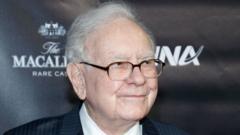A US district judge has made an alarming finding against Apple, stating the company willfully disregarded an injunction in the ongoing case prompted by Epic Games, leading to a possible criminal contempt investigation.
Apple Faces Potential Criminal Contempt Over Antitrust Violations

Apple Faces Potential Criminal Contempt Over Antitrust Violations
Legal scrutiny intensifies as Apple is referred for a criminal contempt investigation related to its handling of App Store policies.
Following an injunction designed to curb Apple's practices in the App Store, Judge Yvonne Gonzalez Rogers has determined that the tech giant violated the court's order, which was aimed at increasing competition and allowing third-party payment options. The ruling could have significant implications for Apple's business model in the competitive app market.
The recent judgement stems from a legal battle initiated by Epic Games, the developer behind Fortnite, which has long criticized the high fees imposed by Apple. In her decision, Judge Rogers claimed that Apple executives, notably CEO Tim Cook, ignored internal advice to comply with the injunction, further noting that CFO Luca Maestri misled the court. The specifics of Apple's violations reportedly include the introduction of a 27% commission on off-app purchases, which contradicts the judge’s earlier ruling that aimed to dismantle Apple’s monopolistic practices.
As a consequence, the Judge has opted to refer the situation to the US Attorney for the Northern District of California to investigate potential criminal contempt charges. In response, Apple has expressed disagreement with the court’s conclusion and plans to appeal the decision. Meanwhile, Tim Sweeney, CEO of Epic Games, announced plans to reintroduce Fortnite to the iOS App Store while extending a proposal for Apple to revise its tax practices on a global scale.
In highlighting the seriousness of Apple's response to the injunction, the judge emphasized that the company's disregard for court orders "will not be tolerated." This legal confrontation not only poses a challenge for Apple but also sets a precedent for app marketplace regulations moving forward.
In a broader context, this case raises critical issues regarding corporate accountability, consumer rights, and regulatory frameworks surrounding digital marketplaces in a rapidly evolving technology landscape. Both Apple and Epic Games are positioned as leaders in this ongoing dialogue, which has implications for consumers and the industry at large.
The recent judgement stems from a legal battle initiated by Epic Games, the developer behind Fortnite, which has long criticized the high fees imposed by Apple. In her decision, Judge Rogers claimed that Apple executives, notably CEO Tim Cook, ignored internal advice to comply with the injunction, further noting that CFO Luca Maestri misled the court. The specifics of Apple's violations reportedly include the introduction of a 27% commission on off-app purchases, which contradicts the judge’s earlier ruling that aimed to dismantle Apple’s monopolistic practices.
As a consequence, the Judge has opted to refer the situation to the US Attorney for the Northern District of California to investigate potential criminal contempt charges. In response, Apple has expressed disagreement with the court’s conclusion and plans to appeal the decision. Meanwhile, Tim Sweeney, CEO of Epic Games, announced plans to reintroduce Fortnite to the iOS App Store while extending a proposal for Apple to revise its tax practices on a global scale.
In highlighting the seriousness of Apple's response to the injunction, the judge emphasized that the company's disregard for court orders "will not be tolerated." This legal confrontation not only poses a challenge for Apple but also sets a precedent for app marketplace regulations moving forward.
In a broader context, this case raises critical issues regarding corporate accountability, consumer rights, and regulatory frameworks surrounding digital marketplaces in a rapidly evolving technology landscape. Both Apple and Epic Games are positioned as leaders in this ongoing dialogue, which has implications for consumers and the industry at large.




















